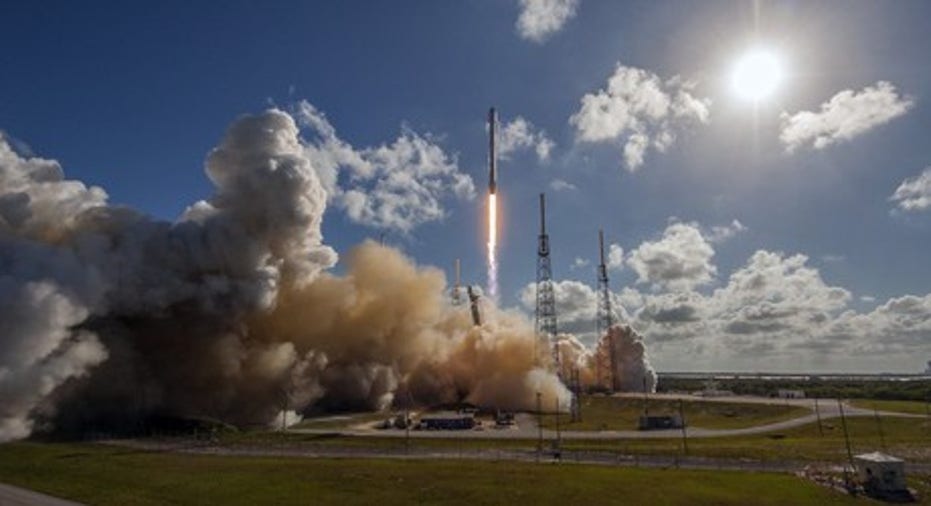SpaceX Rocket Landings: Already Approaching Target 70% Success Rate

On Friday afternoon, SpaceX successfully launched its Falcon 9 rocket, and delivered an Orbital ATK -built Thaicom 8 commercial satellite into orbit.
SpaceX Falcon 9 launch on Friday. Image source: SpaceX.
The Thaicom 8 "was successfully delivered to orbit" -- "and is operating as planned." Orbital ATK, a global leader in aerospace and defense technologies, confirmed this in a press release after the SpaceX mission.
While delivering the Thaicom 8 into correct orbit was SpaceX's primary mission, what was perhaps more exciting was the private U.S. space company's third-successful "experimental" landing in a row -- and fourth overall -- of its 165-foot-tall Falcon 9 boost stage on an autonomous droneship at sea. The ongoing streak of successful missions and rocket landings adds to the company's credibility.
Can SpaceX outperform its 2016 goal?
After the company's failed rocket-landing attempt at the beginning of the year, SpaceX founder and CEO Elon Musk surprisingly predicted the rocket company would be able to achieve approximately a 70% landing success rate this year. At the time, it was difficult to take Musk's prediction seriously. While SpaceX had landed one first-stage Falcon 9 on land in December, all other attempts had failed.
Further, most Falcon 9 landing attempts during 2016 were slated for landing attempts at sea -- an obviously more-difficult feat than landing on a large, open, and perfectly still landing zone on the ground. Even more, the company's disappointing mid-flight rocket explosion in June 2015 was still a fresh -- and very visual -- memory.
But four flights later, and less than halfway through 2016, SpaceX has already achieved a 60% success rate for landings during the year, landing three of five rockets.
It's worth emphasizing, however, that even though SpaceX landed its Falcon 9 rocket on Friday, there's still a chance it could be lost. Musk said on Twitter shortly after the flight that the high-velocity landing caused the rocket to use up its "contingency crush core," creating "some risk of tipping." But if the rocket does make it to shore without tipping over, Musk said the crush core, which is an aluminum honeycomb made for "energy absorption in the telescoping actuator" is "easy to replace."
Friday's landing was particularly notable, as the company said in its mission overview ahead of the Thaicom 8 delivery that a successful landing wouldn't be easy. "As with other missions going to geostationary orbits, the first stage will be subject to extreme velocities and reentry heating, making a successful landing challenging."
SpaceX went into its May landing attempt with a similar narrative, but it landed that time, too.
With three successful landings in a row -- two of which followed deployments into geostationary orbits -- it begs the question: Can SpaceX outperform its 2016 target for rocket landings?
SpaceX is running out of room to store its used rockets. Image source: SpaceX.
Building a reputation
As SpaceX bolsters its streak of successful missions, and adds to its short streak of landings, the company is building a reputation as not only a reliable rocket company, but also a low-cost option. Indeed, this launch of the Orbital ATK-built Thaicom 8 satellite is a good example of business that can be gained as the company beefs up its profile as a reputable rocket company.
"The launch of Thaicom 8 is a case of repeat business for Thaicom, Orbital ATK and SpaceX," said Spaceflight Now's Stephen Clark following SpaceX's Friday mission. "Thaicom ordered the satellite and launch services soon after a Falcon 9 rocket deployed the Thaicom 6 communications craft in orbit in January 2014."
Thaicom views SpaceX as both "innovative" and "cost-effective," said the company's chief commercial officer Patompob Suwansiri in an interview with Spaceflight Now this week. Friday's success likely will strengthen SpaceX's ties with both Orbital ATK and Thaicom PLC even further.
Ultimately, SpaceX's goal is to begin reusing its Falcon 9 rockets in order to reduce costs of space launches even more. Indeed, the company plans to reuse one of its landed rockets as early as this summer.
The article SpaceX Rocket Landings: Already Approaching Target 70% Success Rate originally appeared on Fool.com.
Daniel Sparks has no position in any stocks mentioned. The Motley Fool recommends Orbital ATK. Try any of our Foolish newsletter services free for 30 days. We Fools may not all hold the same opinions, but we all believe that considering a diverse range of insights makes us better investors. The Motley Fool has a disclosure policy.
Copyright 1995 - 2016 The Motley Fool, LLC. All rights reserved. The Motley Fool has a disclosure policy.



















